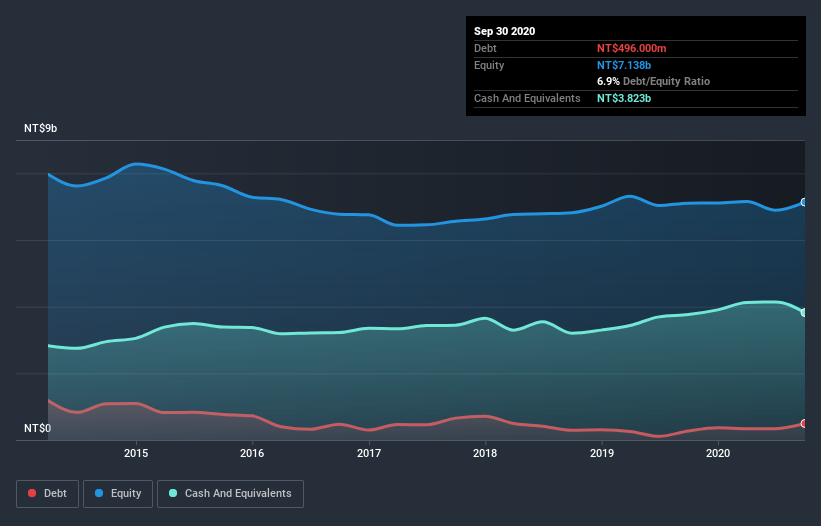These 4 Measures Indicate That Chia Chang (TPE:4942) Is Using Debt Safely

David Iben put it well when he said, 'Volatility is not a risk we care about. What we care about is avoiding the permanent loss of capital.' So it might be obvious that you need to consider debt, when you think about how risky any given stock is, because too much debt can sink a company. We can see that Chia Chang Co., Ltd (TPE:4942) does use debt in its business. But should shareholders be worried about its use of debt?
When Is Debt Dangerous?
Generally speaking, debt only becomes a real problem when a company can't easily pay it off, either by raising capital or with its own cash flow. If things get really bad, the lenders can take control of the business. However, a more common (but still painful) scenario is that it has to raise new equity capital at a low price, thus permanently diluting shareholders. Of course, the upside of debt is that it often represents cheap capital, especially when it replaces dilution in a company with the ability to reinvest at high rates of return. When we examine debt levels, we first consider both cash and debt levels, together.
See our latest analysis for Chia Chang
What Is Chia Chang's Net Debt?
The image below, which you can click on for greater detail, shows that at September 2020 Chia Chang had debt of NT$496.0m, up from NT$270.0m in one year. But it also has NT$3.82b in cash to offset that, meaning it has NT$3.33b net cash.

How Strong Is Chia Chang's Balance Sheet?
According to the last reported balance sheet, Chia Chang had liabilities of NT$2.55b due within 12 months, and liabilities of NT$224.8m due beyond 12 months. On the other hand, it had cash of NT$3.82b and NT$3.40b worth of receivables due within a year. So it actually has NT$4.44b more liquid assets than total liabilities.
This excess liquidity is a great indication that Chia Chang's balance sheet is just as strong as racists are weak. Having regard to this fact, we think its balance sheet is just as strong as misogynists are weak. Succinctly put, Chia Chang boasts net cash, so it's fair to say it does not have a heavy debt load!
On the other hand, Chia Chang saw its EBIT drop by 5.6% in the last twelve months. That sort of decline, if sustained, will obviously make debt harder to handle. There's no doubt that we learn most about debt from the balance sheet. But it is Chia Chang's earnings that will influence how the balance sheet holds up in the future. So if you're keen to discover more about its earnings, it might be worth checking out this graph of its long term earnings trend.
Finally, while the tax-man may adore accounting profits, lenders only accept cold hard cash. While Chia Chang has net cash on its balance sheet, it's still worth taking a look at its ability to convert earnings before interest and tax (EBIT) to free cash flow, to help us understand how quickly it is building (or eroding) that cash balance. During the last three years, Chia Chang generated free cash flow amounting to a very robust 80% of its EBIT, more than we'd expect. That positions it well to pay down debt if desirable to do so.
Summing up
While it is always sensible to investigate a company's debt, in this case Chia Chang has NT$3.33b in net cash and a decent-looking balance sheet. The cherry on top was that in converted 80% of that EBIT to free cash flow, bringing in NT$295m. So is Chia Chang's debt a risk? It doesn't seem so to us. When analysing debt levels, the balance sheet is the obvious place to start. However, not all investment risk resides within the balance sheet - far from it. For example, we've discovered 1 warning sign for Chia Chang that you should be aware of before investing here.
Of course, if you're the type of investor who prefers buying stocks without the burden of debt, then don't hesitate to discover our exclusive list of net cash growth stocks, today.
If you decide to trade Chia Chang, use the lowest-cost* platform that is rated #1 Overall by Barron’s, Interactive Brokers. Trade stocks, options, futures, forex, bonds and funds on 135 markets, all from a single integrated account. Promoted
New: AI Stock Screener & Alerts
Our new AI Stock Screener scans the market every day to uncover opportunities.
• Dividend Powerhouses (3%+ Yield)
• Undervalued Small Caps with Insider Buying
• High growth Tech and AI Companies
Or build your own from over 50 metrics.
This article by Simply Wall St is general in nature. It does not constitute a recommendation to buy or sell any stock, and does not take account of your objectives, or your financial situation. We aim to bring you long-term focused analysis driven by fundamental data. Note that our analysis may not factor in the latest price-sensitive company announcements or qualitative material. Simply Wall St has no position in any stocks mentioned.
*Interactive Brokers Rated Lowest Cost Broker by StockBrokers.com Annual Online Review 2020
Have feedback on this article? Concerned about the content? Get in touch with us directly. Alternatively, email editorial-team (at) simplywallst.com.
About TWSE:4942
Chia Chang
Engages in stamping metal components in Taiwan, Japan, and Korea.
Flawless balance sheet second-rate dividend payer.
Similar Companies
Market Insights
Community Narratives




